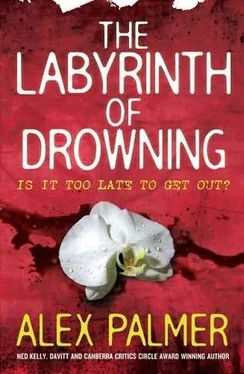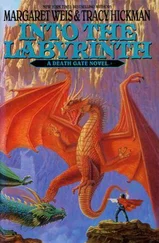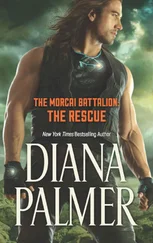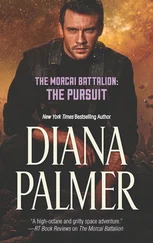Alex Palmer - The Labyrinth of Drowning
Здесь есть возможность читать онлайн «Alex Palmer - The Labyrinth of Drowning» весь текст электронной книги совершенно бесплатно (целиком полную версию без сокращений). В некоторых случаях можно слушать аудио, скачать через торрент в формате fb2 и присутствует краткое содержание. Жанр: Триллер, на английском языке. Описание произведения, (предисловие) а так же отзывы посетителей доступны на портале библиотеки ЛибКат.
- Название:The Labyrinth of Drowning
- Автор:
- Жанр:
- Год:неизвестен
- ISBN:нет данных
- Рейтинг книги:4 / 5. Голосов: 1
-
Избранное:Добавить в избранное
- Отзывы:
-
Ваша оценка:
- 80
- 1
- 2
- 3
- 4
- 5
The Labyrinth of Drowning: краткое содержание, описание и аннотация
Предлагаем к чтению аннотацию, описание, краткое содержание или предисловие (зависит от того, что написал сам автор книги «The Labyrinth of Drowning»). Если вы не нашли необходимую информацию о книге — напишите в комментариях, мы постараемся отыскать её.
The Labyrinth of Drowning — читать онлайн бесплатно полную книгу (весь текст) целиком
Ниже представлен текст книги, разбитый по страницам. Система сохранения места последней прочитанной страницы, позволяет с удобством читать онлайн бесплатно книгу «The Labyrinth of Drowning», без необходимости каждый раз заново искать на чём Вы остановились. Поставьте закладку, и сможете в любой момент перейти на страницу, на которой закончили чтение.
Интервал:
Закладка:
Eventually, he had the gate open. When he left he could put it back in place without it appearing to have been damaged. Before he went inside, he turned to look at what was behind him. There was no path as such down into the national park, just a curtain of trees. Looking in the direction of the road, the house stood as a barrier. No one would see what was going on down here from up there.
He climbed through the gateway and walked around to the front of the house, startling two white-cheeked eastern rosellas that flew up out of the long grass. The exterior was a dirty white stucco with columns on either side of the front door. The windows were dirty and cracked, the window frames rotten. The paint on the front door was peeling. Although the lock was broken, the door itself seemed secure. He shook it; most likely it had been nailed shut on the inside.
There was a separate garage facing a concreted parking area where the grass had grown up through the cracks. The roller door opened for him but there was nothing inside other than the usual rubbish found in most abandoned garages. He looked up at the road. The trees surrounding the property provided a screen from the other houses in the street. This and the fall of the land deepened his sense of isolation.
He walked around to the back of the house again. The building was more compact than it had first appeared. Two rusted metal rubbish bins stood by the back door. He checked them and found they were empty. He was still armed; he took his gun out of its holster and looked behind him. No one was there. He tried the back door. It was locked. He looked around in the intense quiet and then shot out the lock. The cracks brought a deeper silence, a cessation of bird calls. They would echo across the suburb and those who heard them would wonder where they had come from. Let’s see if they bring anyone here.
He pushed the door open. It wedged at an angle against the floor. He stood on the threshold, looking both forward and back. Outside, there was no one but him; looking inside, the room was dark. He took his torch out of his backpack, illuminating what had once been a simple kitchen. The floor and all the surfaces were thickly covered with dirt, the ceiling corners heavy with cobwebs. There was no sign that anyone was there. He stepped inside. It was warm and the air smelled strongly of mould and decay. Following the powerful beam of his torch, he walked past rooms that opened on either side of the hallway. One had been a bathroom, another possibly a dispensary. The floorboards were shaky under his feet and there were signs of water damage where the rain had got in. In any number of places, the plaster had fallen from the ceiling to the floor to lie in heaps on rotting carpet. The whole house was derelict.
He reached what had been the waiting room, revealed under his torch beam. Chairs sat in a line in front of a window covered by net curtains so thick with dirt they were black. Insect nests appeared as dark clumps in the rotting fabric. In the bright afternoon sun, the room was in darkness. His eyes were growing used to his surroundings but in the mass of shadows, he still needed the torch to see the detail of what was around him. The sound of something scrabbling startled him. He looked around quickly but the torchlight revealed only a possum. In what was otherwise silence, he felt certain there was no other living person here besides himself.
On the opposite wall the torch beam showed a long, narrow, aged photographic print that might have come from Amelie Santos’s long-ago university days: Spinal Medulla or Cord . Like a top-heavy jellyfish, the dual hemispheres of the human brain were shown suspended above its long, trailing propellants. Harrigan read the labels attached to these floating threads, some of which were thicker than others: spinal nerve roots and dorsal root ganglia .
Familiar descriptions. When Toby was born, Harrigan had studied the brain and spinal cord seeking to understand his son’s disabilities, forcing himself to accept there was no cure. Since then Toby had lived with permanent damage to the very same spine and nervous system that hung on the wall. This is all we are; these filaments, those hemispheres, the two reflecting mirrors in the brain. Instruments of delusion and cruelty as much as anything else. Glitch them and the person was deformed or dead.
Harrigan turned and his torch raked across the dark to the reception desk. Then he saw it, sitting in the centre of the desk, quietly waiting. An axe with a black stone head protruding from its handle at an oblique angle. The thick, club-like handle was almost a metre long. It had been set down on a carpet square, presumably to protect it.
Harrigan moved forward to scrutinise it. The head was clean and polished. With both hands on the handle, it would be a powerful weapon. He recognised it for what it was: a stone axe from somewhere in the highlands of New Guinea. Grace’s father had several in his keeping, including one not unlike this from West Papua, all stored under lock and key at his home in Point Frederick. As an artefact, it was valuable and it looked old. Old enough to have been brought back in the 1960s by Frank Wells. Why choose this weapon? Unless it had meaning for you. Perhaps it was a weapon once brandished threateningly against you, now turned against others. Frank Wells would know the answer, if he was prepared to admit it.
Harrigan put his torch down and picked up the axe. It was heavy enough to need both hands to lift it. This was the heart of it. The smash. Some fundamental breaking out of every piece of brutality, causal or intentional, that had gone into making Craig Wells or Griffin, whoever he was, whatever he was. But it wasn’t just the violence. What is it you want, that using this can give you? Something beyond words. Some force you decide to let go without any intention to control it. Adrenalin. Just a chemical. Things like the pleasure of manipulation were secondary, they just built you up to this point. But you had to take that step to kill, you had to want to. Something in you had to want to smash that energy outwards and you had to choose this way of letting it happen, knowing what it would do. What the person would look like when you’d finished.
Maybe once you could lose it. You could go mad. But nothing in the history Harrigan had uncovered suggested any set of circumstances like that. If his beliefs were correct and Janice Wells had been the first victim, then that murder had been planned; planned for years by someone still in their teens. What had come first? This weapon stolen from his father or the intent to kill? Or had they both gelled after this weapon had first come into his hands? I can use this. A few simple words. Meeting a boy whose father had taken that step already. Did he hit her? How? The first realisation that this was possible, breaching the membrane that restrained you, to be followed by the act that confirmed: yes, you can kill. Either way it had been a deliberate choice. He could have said, I don’t have to do this . There were always other possibilities. If Harrigan was right and Wells had created his own new persona out of the death of the real Joel Griffin, why not choose to create a new life for himself some other way? Because he wanted this. He wanted what it gave him.
Harrigan set the axe down where it had been, stepped back from what felt like the edge of nowhere. He had to get out of here soon. It was a terrifying place.
His torch beam touched on the net curtains. The blackness impregnating the material wasn’t only dirt, it was old blood. This was the epicentre. While you were waiting to see the doctor. He glanced in a line from the reception desk to a door, now shut. The consulting room.
He opened the door slowly. The smell of mould throughout the building had grown to be almost overpowering; in this room it was the stink of death. Harrigan took out his handkerchief and put it over his mouth and nose.
Читать дальшеИнтервал:
Закладка:
Похожие книги на «The Labyrinth of Drowning»
Представляем Вашему вниманию похожие книги на «The Labyrinth of Drowning» списком для выбора. Мы отобрали схожую по названию и смыслу литературу в надежде предоставить читателям больше вариантов отыскать новые, интересные, ещё непрочитанные произведения.
Обсуждение, отзывы о книге «The Labyrinth of Drowning» и просто собственные мнения читателей. Оставьте ваши комментарии, напишите, что Вы думаете о произведении, его смысле или главных героях. Укажите что конкретно понравилось, а что нет, и почему Вы так считаете.












